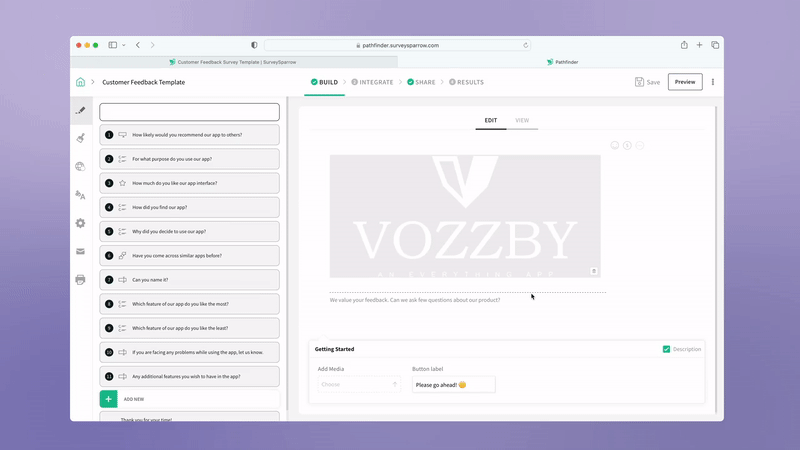Business
50+ Questions to Ask a Prospective Business Partner [Free Template]
Article written by Kate Williams
Content Marketer at SurveySparrow
9 min read
28 May 2025

60 Seconds Summary:
Choosing a business partner is as critical as choosing the business itself. This guide gives you 50+ vetting questions across key categories as well as a free, customizable survey template to make the process effortless.
Learn how to define responsibilities, align visions, and avoid common pitfalls by asking the right questions upfront. Read on!
Finding the right business partner feels like searching for a unicorn in a haystack! I know. I get you.
But when you find prospects, do not dive headfirst into the relationship. Understanding your potential partner is a must. That’s not even a question! Choosing the wrong companion can turn your entrepreneurial dream into a nightmare.
I have collated more than 50 substantial questions to ask a prospective business partner, so you don’t have to worry later. You can include them in your survey and roll them out as the first step to a successful partnership.
But before that, you need to understand a few points.
Plus I have added a sample partnering questionnaire template. Feel free to try it and customize it if you like.
Essential Factors to Evaluate When Selecting a Business Partner
Grab your pen and paper because the points we discuss will decide your business’s future. Here are some points you should consider before you say “I Do” to a trusted match.
1. Compatibility Check
Do your values align? Will your strengths complement each other like a well-matched team? These are things you need to consider before you decide to team up. Think about your beliefs, work styles, and long-term objectives. Do they match up with your partner’s? When your values and strengths mesh well, it sets a solid base for a successful partnership.

2. Defining the Deal
Transparency is Key. Being clear about who’s doing what in your partnership is vital. Decide upfront who will handle different aspects of the business, how major decisions will be made, and how you’ll solve conflicts. This clarity helps prevent misunderstandings and keeps your partnership running smoothly.
3. Charting the Course
Discuss how you’ll handle challenges together, from work habits to conflicts.
Every partnership faces hurdles, but you can overcome them with good communication and a clear plan. Talk about your work habits, how you like to communicate, and how you deal with disagreements. Being open and honest lets you spot problems early and find solutions together.

4. Beyond Business
Get to know each other personally to build a strong bond. While business compatibility matters, so does personal connection.
Take the time to learn about each other’s interests and values outside of work. Building a solid personal connection fosters trust and teamwork, strengthening your partnership and making it more fulfilling. But yes, it’s all about balance.
Top Questions to Ask a Prospective Business Partner
The power of asking the right questions cannot be overlooked. If you are hunting for a business partner or an investor, consider trying to know them inside-out. Now, investing time in these questions might not guarantee a smooth sail, but it significantly increases the chances of a rewarding journey with the new mate.
Here's a customizable template made with SurveySparrow for you to try...
Agency Partnering Questionnaire
Use This TemplateYou can add the questions discussed below, edit the theme, color, and logo, and make it your own. The best part? There are multiple charging options! Plus, you get to collect the data, visualize it on an executive dashboard, and analyze it with advanced analytics tools.
So, where were we? Ah, yes...
I have divided the questions into five categories:
- Partnership Expectations
- Values and Vision Alignment
- Strengths and Weaknesses
- Financial and Legal Matters!
- Roles and Responsibilities
Let’s start with…
I. Partnership Expectations
Before teaming up, being on the same page about what each person expects from the partnership is crucial. This helps avoid misunderstandings and keeps things running smoothly.
Here are five simple questions you can ask a potential partner:
1. How will we make major decisions? Does everyone have an equal say, or do you think there must be a designated leader?
2. What are your long-term goals and aspirations for this partnership?
3. How much time and effort are we each willing to commit? Are there periods of expected heavy workload or flexibility needed?
4. Do you want to establish specific boundaries or limitations within the partnership? If yes, what?
5. How will we handle disagreements? Is there a specific process you like to follow for resolving conflict constructively?
II. Values and Vision Alignment
It is essential to ensure you and your prospective partner are in sync. It would be best if you shared similar values and visions. This is to ensure that you both are rowing in the same direction.
Values alignment refers to the compatibility of your core beliefs, principles, and motivations. Vision alignment represents shared aspirations for the future of your business.
1. What are your core values, both personally and professionally?
2. What do you believe is most important in running a business?
3. What kind of work ethic do you have, and how does it match mine?
4. Are there any potential conflicts between our values, and how would we navigate them?
5. Are we both comfortable with the risk and commitment required to achieve the vision?
III. Strengths and Weaknesses
Strengths are your areas of expertise, talent, and experience. They represent what you excel at and how you contribute value to the partnership. On the other hand, weaknesses are areas where you might require support or have room for improvement.
Each partner brings unique pieces – their strengths and weaknesses – that, when combined, create a complete picture.
1. What do you think are your greatest strengths in business? What tasks or areas do you excel in?
2. How have you used these strengths to succeed in previous endeavors?
3. Are you open to feedback and willing to work on improving your weaknesses?
4. How comfortable are you delegating tasks to your partner in areas where they excel?
5. What are you most passionate about contributing to the partnership?
IV. Financial and Legal Matters
Financial and legal matters act as a sturdy foundation for a business. Moreover, open and transparent communication regarding finances and legal structures sets a solid basis for minimizing future risks and fostering trust.
Make sure you discuss your individual financial history, including debts, credit scores, and investment portfolios. Transparency builds trust and ensures financial compatibility.
Financial Consideration:
1. What level of initial capital are you comfortable contributing?
2. Do you have any outstanding debts or financial obligations that could impact the business?
3. Have you previously held ownership in other businesses? If so, how did you handle finances in those partnerships?
4. Do you have a preferred method for financial management (e.g., accounting software, bookkeeping services)?
5. What financial red flags would be dealbreakers for you in a partnership?
Legal Consideration:
6. Have you researched different business structures (e.g., general partnership, LLC, LLP)?
7. Do you have existing intellectual property (e.g., patents, trademarks) that could impact the business?
8. Have you considered the legal implications of insurance needs for the business?
9. Are you comfortable seeking legal counsel to ensure proper documentation and compliance?
10. Are there any potential risks or liabilities you’re concerned about, and how do you propose we address them?
Keep an eye on the next one. It can make or break your business.
V. Roles and Responsibilities
Clarifying roles and responsibilities will help you stay organized and focused on your goals. Plus, defined boundaries prevent confusion and potential clashes over who does what.
You need to understand the areas of expertise to create a smooth workflow that facilitates informed decision-making.
Here are a few questions you must consider asking:
1. On what types of decisions will each partner have primary authority?
2. What are your preferred communication channels for delegating tasks and providing updates?
3. How will you address potential roadblocks or challenges related to roles and responsibilities?
4. How will you handle disagreements or conflicting perspectives?
5. How do you feel about taking on new tasks or learning new skills as needed?
6. Do you want to set boundaries or limitations regarding our roles and responsibilities?
Read More: Top 50 Student Survey Questions For Enhanced Student Experience
How Can SurveySparrow Help in Asking the Right Questions?
Well, now that you have the questions listed, you need a means to reach out to your prospects, right? Yes, a face-to-face chat or discussion is the best way, but it’s a busy world. Both you and your potential partners might have places to be.
In such cases, a survey is the best hassle-free option! And what better way than rolling out a conversational form to keep them engaged?
Oh, wait! Admit it: whether you are a school-going kid or the owner of a multinational company, long, boring traditional surveys tire you out. We end up abandoning them or procrastinating until the last day to fill them. Chat-like surveys, on the other hand, let you have conversations with your respondents.
SurveySparrow offers you precisely that. And more!

You can create conversational surveys from scratch or use the vast template library. Share them via multiple platforms, collect data, visualize them on the executive dashboard, analyze them, and make informed decisions based on the insights gained.
Explore SurveySparrow's Multi-platform sharing features →
The pre-populated templates can be edited as per your needs and preferences. You can revise the questions, reorder them, delete those unwanted ones, or add those you feel must not be missed.
If you feel a bit lazy or wish to add a touch of creativity to the questions, you can use the Wing Feature to rephrase, edit, expand, or rewrite it the way you want.
Here’s how you do it:

Easy! Right? Now, save time, use this agency partnership questionnaire for your potential partners, and understand them inside out.
Feel free to use the survey template attached above and make it your own. Add the questions we discussed, and remove the ones you feel are unnecessary.
Wait, how about a bonus for you?
It is important to know your clients and customers so that you can align your brand and products according to their needs. And I know having a ready-to-use template can save a ton of your time!
Here's one you can roll out immediately...
Business Survey Template
Use This TemplateWrap Up!
Just like choosing the right business partner is crucial, choosing the perfect questions to ask your prospects is even more important.
By asking the right questions and understanding each other’s values, roles, and expectations, you can find a partner who shares your vision and complements your strengths. Take your time, communicate openly, and trust your instincts. You can achieve great things together with the right partner by your side.
Happy Exploring!
Start 14 Days free trial

Kate Williams
Frequently Asked Questions (FAQs)
Essential questions include questions on their long-term business goals, how they handle conflicts or disagreements, their risk tolerances and how much time and capital they'd invest.
A business partnership questionnaire should cover:
Personal and professional values, goals and expectations, strengths and weaknesses, conflict resolution preferences, financial contributions and ownership stakes, risk tolerance and exit strategies.
Vetting a business partner helps you avoid future conflicts, ensures your goals align, and confirms they bring the right skills and mindset. It’s better to ask the tough questions now than face costly problems later.
Related Articles

Best Of
20+ Best CRM Software of 2024: Everything You Need to Know
17 MINUTES
10 April 2019

Best Of
How to Create a Support Ticketing System the Easy Way
7 MINUTES
18 November 2021

Brand Experience
What Is Corporate Reputation? 10 Tips to Improve It
12 MINUTES
15 January 2025

Best Of
Top 10 Business Process Automation Tools In 2024
14 MINUTES
4 May 2021
